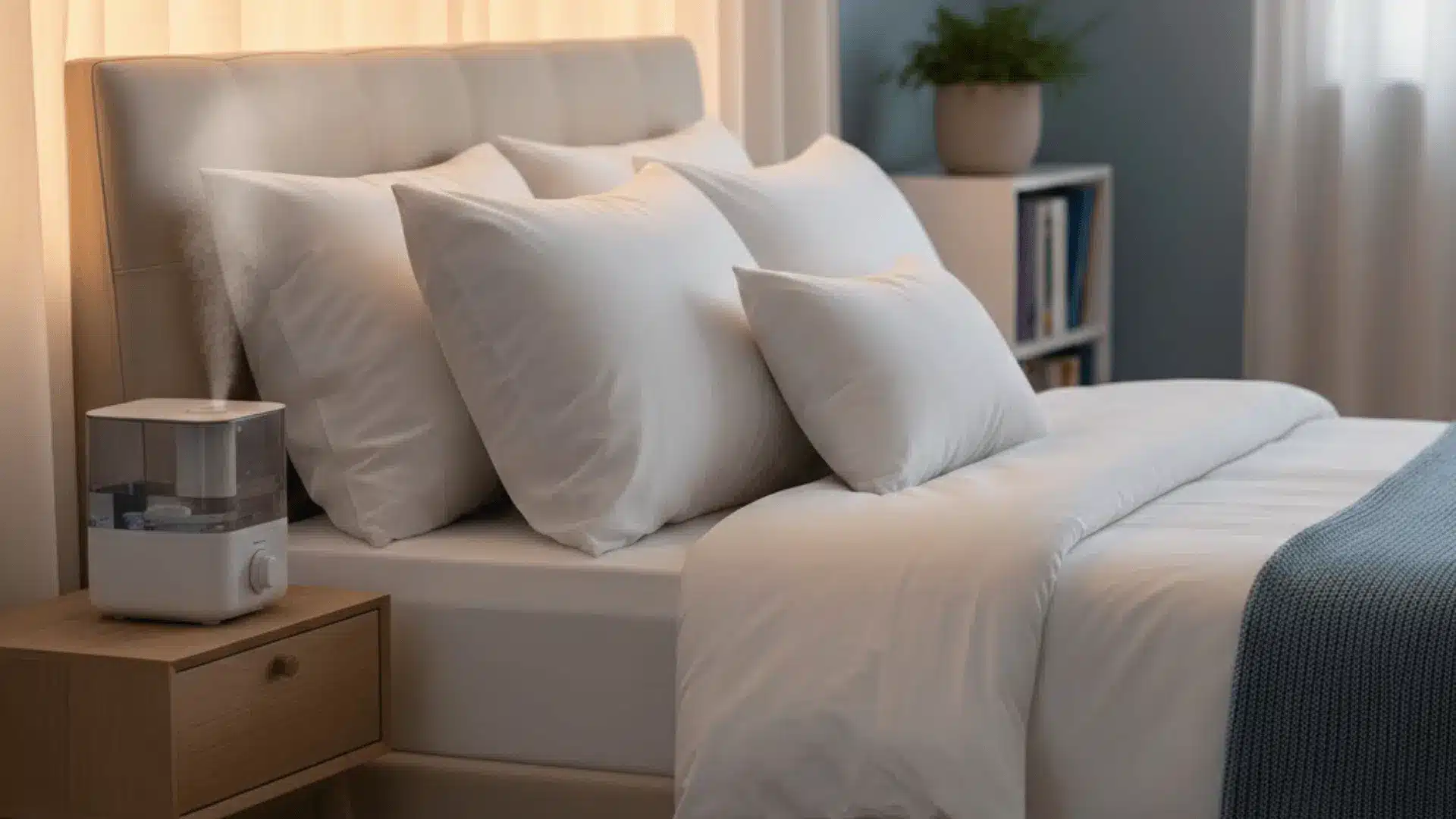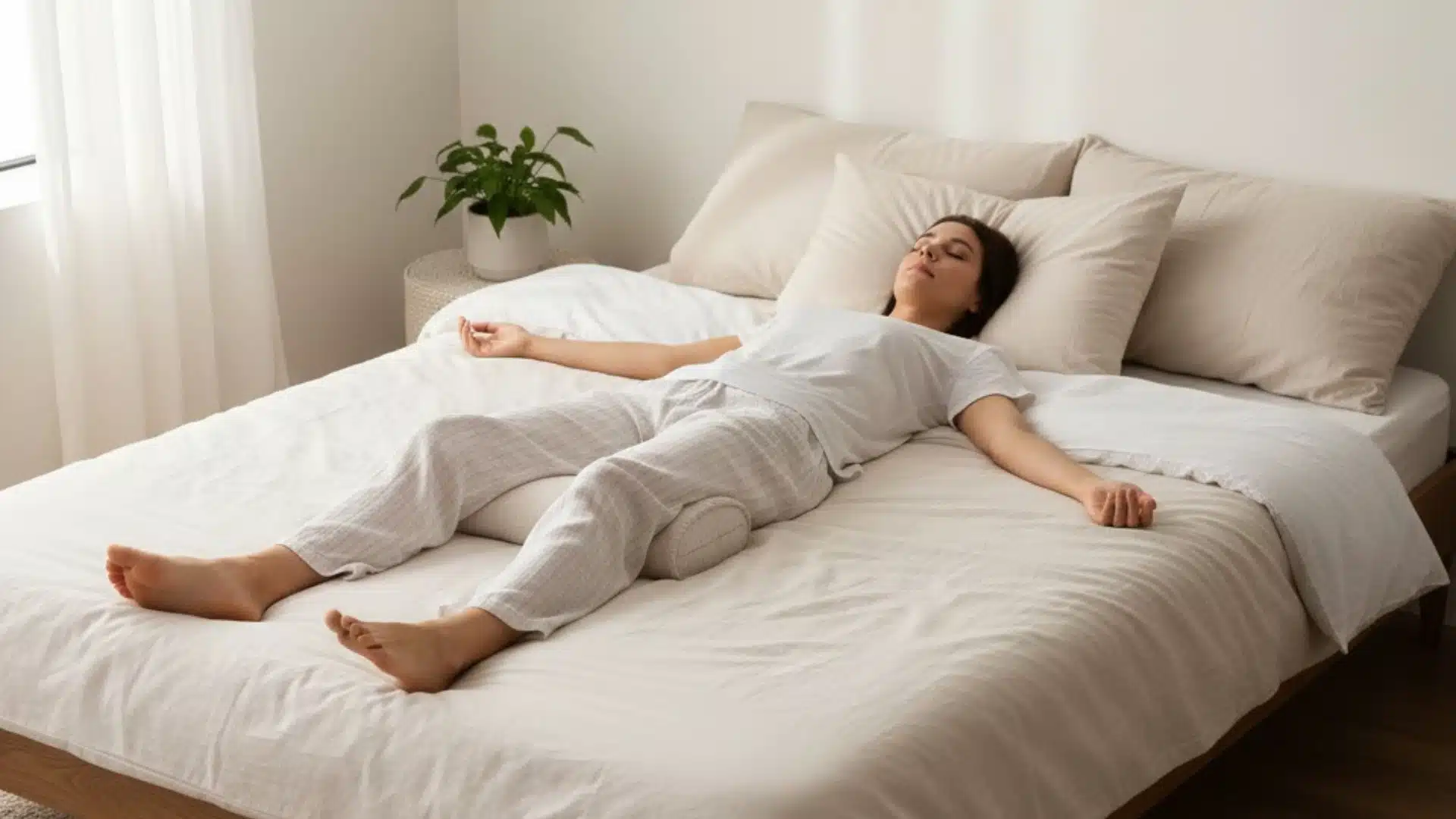Have you ever woken up gasping for air in the middle of the night and wondered, “Why do I choke in my sleep?” It’s a frightening feeling, and it can leave you feeling drained and uneasy the next day.
If you’ve experienced choking in sleep, you’re not alone. Many people face this issue, and it’s more common than you may think.
Today, I’ll walk you through the potential causes of choking in sleep and share practical tips to help you sleep better. Let’s work together to get you the restful sleep you need and improve your overall well-being.
Why Do I Choke in My Sleep: Common Causes
Several health conditions can make you wake up gasping for air or choking while sleeping. Let’s look at the most common reasons this happens.
1. Sleep Apnea
Sleep apnea is the top cause of choking during sleep. This condition happens when your airway gets blocked while you sleep.
Your breathing stops for short periods throughout the night. When your brain notices you’re not getting enough oxygen, it wakes you up with a choking or gasping feeling.
Signs you might have sleep apnea include:
- Loud snoring that bothers others
- Feeling very tired during the day
- Waking up with headaches
- Having trouble focusing at work
People who are overweight, older adults, and men face higher risks for sleep apnea. If someone in your family has this condition, you might be more likely to get it too.
2. Acid Reflux
Acid reflux, also called GERD, can cause choking episodes at night. This happens when stomach acid flows back up into your throat.
The acid irritates your throat and can make you wake up coughing or choking. You might also taste something sour in your mouth.
Common signs of nighttime acid reflux include:
- Heartburn that gets worse when lying down
- A sour taste in your mouth when you wake up
- Coughing or clearing your throat during the night
- Feeling like something is stuck in your throat
3. Allergies and Sinus Problems
Allergies can cause mucus to build up in your throat while you sleep. This extra mucus can trigger coughing and choking episodes.
Dust mites in your bedroom, pet hair, or pollen can make allergies worse at night. When your sinuses are stuffed up, mucus drips down your throat and causes problems.
You might notice these symptoms if allergies are the cause:
- A stuffy nose that gets worse at bedtime
- Frequent throat clearing
- Coughing that starts when you lie down
- Watery eyes or sneezing
4. Nerve and Muscle Problems
Some medical conditions affect the nerves and muscles that control swallowing and breathing. These problems can make choking more likely during sleep.
Conditions like epilepsy can cause seizures at night that lead to breathing problems. Muscle diseases can weaken the throat muscles that keep your airway open.
If you have a neurological condition, work closely with your doctor to manage symptoms that affect your sleep.
How to Know If You Have a Choking in Sleep Problem

Recognizing the signs early can help you get treatment faster. Here are the main symptoms to watch for:
Nighttime Symptoms
Choking episodes in sleep often come with noticeable signs during the night. Watch for these common symptoms that may indicate a problem:
- Waking up gasping or feeling like you can’t breathe
- Your partner says you make choking sounds while sleeping
- Frequent coughing fits that wake you up
- Dry mouth or sore throat in the morning
If you notice these nighttime patterns regularly, it’s a good idea to get checked by a doctor to find out what’s causing them.
Daytime Symptoms
The effects of choking in sleep don’t stop when you wake up; they can impact how you feel and function during the day.
- Feeling tired even after a full night’s sleep
- Having trouble staying awake during the day
- Difficulty remembering things or focusing
- Mood changes like feeling grumpy or sad
Paying attention to these daytime issues can help you connect the dots and take steps toward better, more restful sleep.
When to See a Doctor
You should talk to a doctor if choking episodes happen more than once a week. Don’t wait if you also have high blood pressure, diabetes, or heart problems.
Getting help early can prevent serious health issues down the road. Your doctor can figure out what’s causing the problem and suggest the right treatment.
Finding Out What’s Behind Your Symptoms
Before you can treat choking in sleep effectively, you first need to know what’s causing it. Here’s how doctors pinpoint the underlying issue:
Sleep Studies
A sleep study is the best way to diagnose sleep apnea. You’ll spend a night at a sleep center where machines monitor your breathing, heart rate, and brain activity.
Some doctors now offer home sleep tests. These use smaller devices that you wear while sleeping in your own bed.
Other Tests
Depending on your symptoms, your doctor might suggest:
- Blood tests to check for allergies
- X-rays of your throat and sinuses
- Tests to measure stomach acid levels
- Exams by specialists who focus on ear, nose, and throat problems
Choking in Sleep: Treatment Options that Work
The right treatment depends on what’s causing your choking episodes. Here are the most effective approaches:
1. Lifestyle Changes
Simple lifestyle changes can significantly reduce the risk of choking during sleep. If you’re overweight, losing 10-15 pounds can help reduce airway blockage, as excess weight around the neck contributes to this issue.
Sleeping on your side, rather than your back, can also help prevent airway obstruction; a useful trick is to place a tennis ball in the back of your pajama shirt to encourage side sleeping.
Additionally, adjusting your eating habits by avoiding large meals 3-4 hours before bed, as well as steering clear of spicy foods, chocolate, and caffeine in the evening, can reduce symptoms.
Finally, quitting smoking is crucial, as it causes swelling in the throat and airways, increasing the likelihood of choking during sleep.
2. Medical Treatments
CPAP machines: The most common treatment for sleep apnea. This device blows air through a mask to keep your airway open all night.
Oral appliances: These look like mouth guards and move your jaw forward to prevent airway blocking. They work well for mild to moderate sleep apnea.
Medications that can help with specific causes:
- Acid blockers for reflux problems
- Allergy medicines for sinus issues
- Seizure medications for neurological conditions
3. Surgery Options
For severe cases that don’t respond to other treatments, surgery may be necessary. Common procedures include removing excess tissue from the throat to clear the airway and correcting a deviated septum in the nose to improve airflow.
In some cases, weight loss surgery may be recommended for individuals with severe obesity, as reducing excess weight can help reduce airway obstruction and alleviate choking during sleep.
Preventing Future Episodes of Choking in Sleep
Simple lifestyle changes can go a long way in reducing choking episodes and improving your overall sleep quality. Here are some common practices that can help:
- Keep the room cool, dark, and quiet.
- Use a supportive pillow and wash bedding weekly.
- Use an air purifier and keep pets out if you’re allergic.
- Go to bed and wake up at the same time daily.
- Avoid screens an hour before bed.
- Manage diabetes and high blood pressure.
- Practice stress management like deep breathing before bed.
Making these habits part of your nightly routine can help you breathe easier, sleep better, and wake up feeling more refreshed.
Wrapping Up
Choking in sleep can be scary and exhausting, but it’s not something you have to just live with.
I’ve learned that with the right steps, you can improve your sleep and start waking up feeling more refreshed and energized. The sooner you address it, the sooner you can enjoy better, more restful nights.
If you’ve been dealing with choking in sleep, don’t wait; talk to your doctor. They can help figure out what’s causing it and guide you toward the best treatment for your situation.
Taking action now can make a huge difference in how you feel during the day.
If you want more ideas and tips to improve your sleep and overall health, check out my other blogs. You deserve nights that leave you feeling your best.









